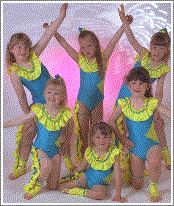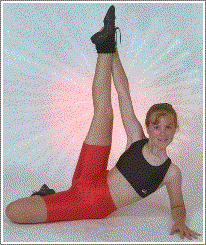 A Window on ...
A Window on ...Dance
Information
 A Window on ... A Window on ...Dance |
Information |
 | Where to LookThere are a few things that you can do to learn more about dancing. Here are some suggestions.Basic Information is available from:
| |||||||||||
 | Magazines, books and videosYour local library or newsagent is a good starting point for information. Look in the adult and children's sections for useful books or videos about dance. The librarian can help if you have difficulty finding something.Dance Books On-line, at http://www.dancebooks.co.uk/, is a publishing company that sell books, CDs, and videos about dance and human movement. Larger newsagents will also stock dance books and videos as well as dance magazines. Some publications even provide CD ROMs with music that you can dance to! Dance Now is Britain's liveliest dance magazine on the web. Web site, http://www.dancebooks.co.uk/now.htm | |||||||||||
 | Dance Classes This is probably the best place to ask for information. A good dance teacher will tell you about the classes he or she offers and will give you advice about the type of class that suits you. This is probably the best place to ask for information. A good dance teacher will tell you about the classes he or she offers and will give you advice about the type of class that suits you. If you are interested in pursuing a career in dance then good training at an early age is invaluable. However, this does depend on the type of dancing you want to become involved with. Although boys may not develop their interest until they are in their teens, young girls have often started their training by the age of 12. Check out some of the web links below for ideas.
| |||||||||||
 | National Dance CompaniesMost National Dance Companies take part in national tours. This is a good opportunity for you to see dancing at the highest level. Nearly all companies have an education officer who is more than willing to answer queries from potential young dancers.

Some companies offer young dancers the chance to participate in regional dance workshop. Contact the education officer of each company for details. Addresses for dance companies can be found in a large library. Some dance companies are on the Internet. See: | |||||||||||
 | Folk FestivalsLocal folk festivals often play host to the more traditional and ethnic dance groups. Morris and sword dancers, clog dancers and ethnic groups are always popular. If you are interested in joining such a group, then you should contact them directly. They welcome new enthusiastic members. Your local Tourist Board or Central Library will have details of regional Folk FestivalsIf you do become involved with this group, however, you should be aware that you will need appropriate dress and footwear when you appear with the group in public - so check out the costs involved when you contact the group. | |||||||||||
 | Dance and Leisurewear Suppliers Suppliers are happy to provide information and advice about all types of dance wear. In smaller towns you may have only one supplier but in larger towns and cities you should find there is more choice. Suppliers are happy to provide information and advice about all types of dance wear. In smaller towns you may have only one supplier but in larger towns and cities you should find there is more choice.Although a great deal of modern, bright coloured clothes are being promoted, dance teachers generally have their own views about the standard of dress in their classes. Before you buy check with your dance teacher about his or her dress code. Some suppliers are advertising through the Internet and you should use the same caution when buying from this source as you would from any mail order company. If you need special equipment or dance wear that are only available from a national supplier, for example clogs for clog dancing, then you must expect to pay more.
| |||||||||||
 | The Internet: Web linksDance Books On-lineA publishing company that retails books, CD's and videos about dance http://www.dancebooks.co.uk/
Dance Now
Scottish Country Dancing
Hitchikers Guide to Line-dancing
The Line-Dance FAQ Homepage
The European Dance Server
Ballroom Dancing UK
Birmingham Royal Ballet
The Royal Ballet School
The International Dance Sport Federation IDSF
International Dance Teachers Association
Footlights
| |||||||||||
| ||||||||||||
|
| ||||||||||||